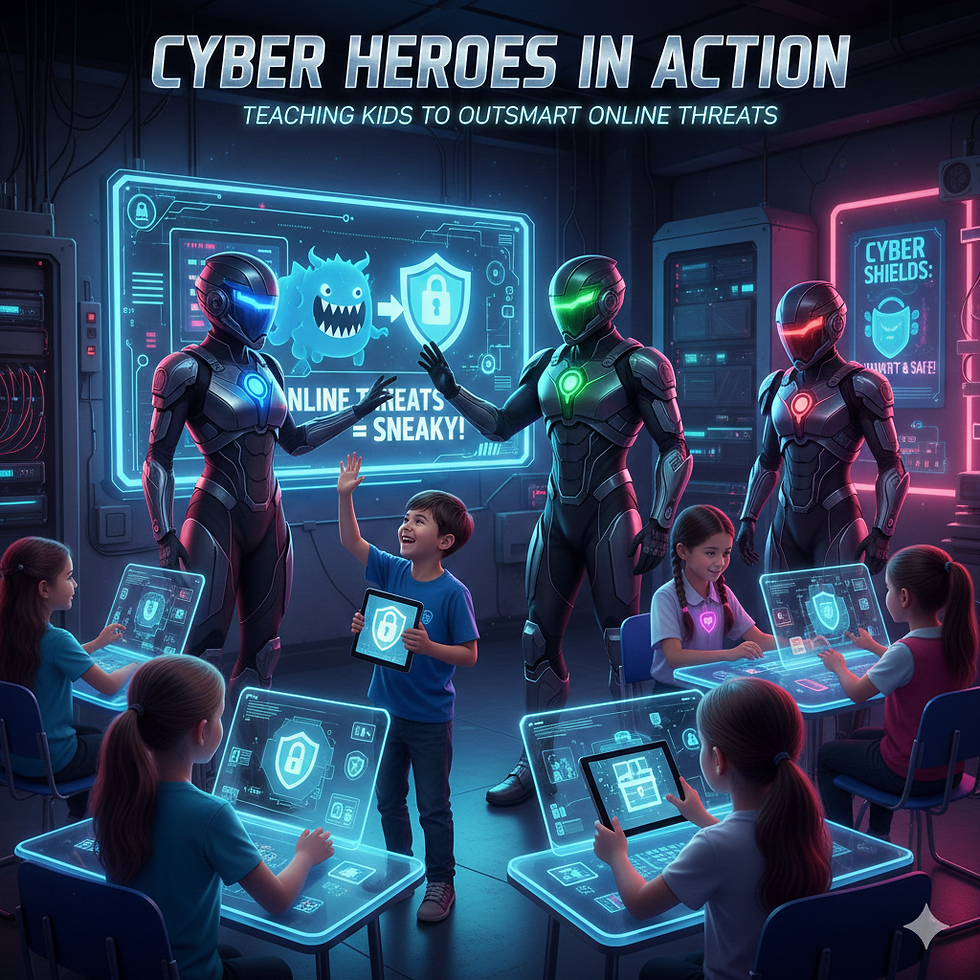Cyber Heroes in Action: Teaching Kids to Outsmart Online Threats
- Valarian Couch
- May 28, 2025
- 6 min read
Updated: Jan 13

The Digital Playground: Why Our Kids Need Cyber Superpowers
Remember when "stranger danger" meant watching out for suspicious vans and refusing candy from people you didn't know? Those days seem almost quaint now. Today's kids are navigating a vastly more complex landscape where threats don't just lurk on street corners but behind friendly usernames, entertaining apps, and tempting game downloads.
By the time most children reach third grade, they're regularly using tablets, smartphones, or computers—often unsupervised. The average American child now receives their first smartphone at age 10, and nearly 40% of kids have social media accounts before they turn 12, despite most platforms requiring users to be at least 13.
This isn't about fearmongering—the digital world offers incredible opportunities for learning, connection, and creativity. But just as we wouldn't send kids to cross a busy street without teaching them to look both ways, we shouldn't send them into the online world without the right skills.
That's where the concept of Cyber Heroes comes in.
Creating Digital Citizens, Not Digital Targets
The Cyber Heroes approach isn't about scaring kids offline or monitoring their every digital move. Instead, it's about empowerment—giving children the knowledge and confidence to recognize threats, make wise decisions, and navigate online spaces safely.
This comprehensive initiative (developed through collaboration between Google, Test Achats, and Child Focus) uses age-appropriate lessons and gamification to teach critical thinking skills that help kids become responsible digital citizens. The curriculum is specifically designed for children ages 8-12—the perfect window when they're beginning independent online exploration but still receptive to guidance.
The Cyber Code of Heroes: Five Fundamental Powers
The core of the Cyber Heroes program revolves around five essential principles that every child should understand before venturing online. Think of these as digital superpowers that help kids protect themselves and others:
1. Share with Care (Be Cyber Smart)
The internet never forgets—a lesson many adults learned the hard way. Kids need to understand that once something is posted online, it can exist forever and be seen by anyone. This principle teaches children to:
Think before posting photos, personal information, or location data
Understand the concept of a digital footprint
Consider how their words and actions online might affect others or themselves in the future
Treat online communication with the same thoughtfulness as they would face-to-face interactions
Real-world scenario: Before posting that funny dance video or sharing which school they attend, Cyber Heroes pause and ask: "Would I be comfortable with everyone—including future teachers, coaches, or even college admissions officers—seeing this?"
2. Don't Fall for Fake (Be Cyber Alert)
Critical thinking is more important than ever in a world where deepfakes, misinformation, and scams are increasingly sophisticated. This principle helps kids:
Recognize suspicious messages, even when they appear to come from friends
Identify potential phishing attempts
Question sources and check information before believing it
Understand that not everything online is as it seems
Real-world scenario: When a game offers "free V-bucks" or a message claims they've won a free tablet, young Cyber Heroes know to be skeptical and check with a trusted adult.
3. Keep Your Secrets Safe (Be Cyber Strong)
Password security and personal information protection are fundamental skills in the digital age. This principle teaches kids to:
Create strong, unique passwords
Never share passwords, even with friends
Recognize what constitutes personal information
Understand which details should remain private
Use privacy settings effectively on games and apps
Real-world scenario: Cyber Heroes know that their birthday, address, full name, and school information are valuable data that should be protected and not freely shared in online profiles or with new online friends.
4. It's Cool to Be Kind (Be Cyber Kind)
The online world can sometimes feel consequence-free, leading to behavior kids would never exhibit face-to-face. This principle emphasizes:
Digital empathy—remembering real people exist behind screens
Standing up against cyberbullying
The importance of a positive digital footprint
How kindness online creates better spaces for everyone
Real-world scenario: When witnessing mean comments in a game chat, Cyber Heroes don't join in or stay silent—they either respond with kindness or report inappropriate behavior.
5. When in Doubt, Talk It Out (Be Cyber Brave)
Perhaps most importantly, kids need to know they're not alone in navigating online challenges. This principle encourages:
Seeking help from trusted adults when uncomfortable situations arise
Reporting inappropriate content or behavior
Open communication about digital experiences
Building resilience when facing online challenges
Real-world scenario: If someone online asks to meet in person or requests photos, Cyber Heroes know this is a situation to discuss immediately with parents or guardians.
Making Learning Fun: Interland and Beyond
The genius of the Cyber Heroes approach lies in its delivery. Rather than dry lectures about internet safety, the program utilizes Interland—an interactive, browser-based game that puts kids in scenarios where they practice these principles in action.
In colorful, engaging environments, children help their characters navigate challenges like:
Identifying which information is safe to share
Blocking and reporting inappropriate behavior
Spreading kindness to counter negativity
Creating strong passwords
Identifying phishing attempts
This gamified approach meets kids where they are—in digital spaces—while teaching them how to navigate those spaces more safely.
Bringing Cyber Heroes Home and to the Classroom
While formal programs like Cyber Heroes provide excellent frameworks, the most effective digital safety education happens when reinforced both at home and at school. Here's how to implement these principles in daily life:
For Parents:
Have regular, non-judgmental conversations about online experiences
Set clear expectations and boundaries for device use
Model good digital citizenship yourself
Create a family media agreement outlining shared values for online behavior
Use everyday situations as teaching moments rather than one-time "big talks."
Do you need more structured guidance? Our Family Cyber Safety Plan and Parental Digital Safety Training services provide personalized support for families navigating these complex waters.
For Educators:
Incorporate digital citizenship lessons across the curriculum rather than treating it as a separate topic
Use role-playing scenarios to practice online decision-making
Encourage peer-to-peer learning where students teach each other about digital safety
Partner with parents to ensure consistent messaging
Consider school-wide initiatives that create a culture of responsible technology use
Schools looking to develop comprehensive approaches can explore our Custom Cybersecurity Workshops for K-12 or Custom Curriculum Development for Cyber STEM services.
Beyond the Basics: Growing with Technology
As children mature, their online activities and the associated risks evolve. True digital resilience means adapting these core principles to new platforms and challenges. By middle and high school, conversations can expand to include:
Digital reputation management
Understanding data collection and privacy policies
Recognizing manipulative design in apps and games
The basics of secure online shopping
Protecting accounts from increasingly sophisticated attacks
Managing online relationships responsibly
The foundational Cyber Heroes principles scale beautifully to these more complex scenarios when children have internalized the core concepts early.
The Long Game: Why This Matters
Teaching cybersecurity to kids isn't just about preventing immediate problems—it's about raising a generation of digitally literate citizens who understand the opportunities and responsibilities of our connected world.
Children who learn these skills early:
Develop stronger critical thinking abilities that transfer to offline scenarios
Build healthier relationships with technology
Are better prepared for future careers where digital literacy is essential
Experience fewer negative online incidents
Develop greater resilience when digital challenges do occur
Perhaps most importantly, they're equipped to help shape the digital world rather than merely survive it.
Becoming Cyber Heroes Together
The most effective approach to children's online safety isn't about installing the proper monitoring software or blocking every potentially dangerous site. It's about education, communication, and empowerment—giving kids the tools to make good decisions even when adults aren't looking over their shoulders.
At Dr. Valarian Couch, we're committed to helping families and schools develop comprehensive approaches to cybersecurity education that work in the real world. Whether through our Custom Cybersecurity Workshops, Family Safety Plans, or School District Security Blueprints, we believe in creating digital citizens who aren't just protected—they're empowered.
Ready to help the children in your life become Cyber Heroes? Contact us today to explore how we can support your family or school's journey toward digital resilience.
In today's world, digital safety isn't optional—it's essential. With the right approach, it can be an exciting adventure rather than a source of anxiety.
.jpg)




Comments